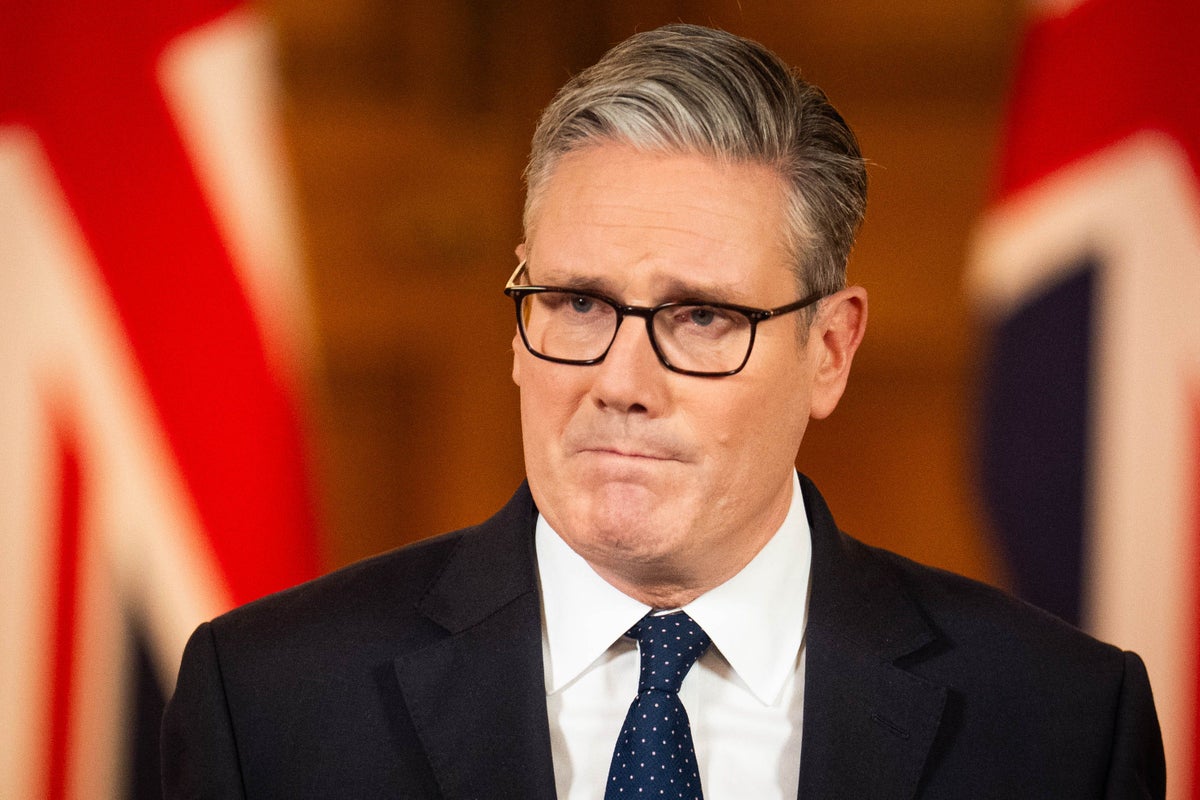
Pro-Palestine protesters are set to defy Sir Keir Starmer’s call not to demonstrate on the second anniversary of the October 7 attacks after the Prime Minister said the plans were “un-British”.
University students from several institutions are expected to gather at an event in London on Tuesday, two years to the day since some 1,200 people were killed and 251 taken hostage during Hamas’s incursion into Israel.
Details of the demonstration in the capital are posted online and include groups from King’s College London, the London School of Economics, University College London, SOAS and Roehampton University.
Other events are set to take place outside of London, including protests at Strathclyde University, Edinburgh University and the University of Leeds.
Writing in the Times, Sir Keir had said the timing of the protests was “un-British” and showed “little respect for others”.
The anniversary of the attacks comes less than a week after knife-wielding terrorist Jihad Al-Shamie, 35, killed two men at the Heaton Park Hebrew Congregation Synagogue.
Adrian Daulby, 53, and Melvin Cravitz, 66, both died in the attack which unfolded on Yom Kippur, the holiest day in the Jewish calendar.
Greater Manchester Police has pledged to put “every available resource into making sure that we understand precisely what has happened”.
Sir Keir said: “Today we mark two years since the horrifying attacks on Israel by Hamas terrorists on October 7, 2023.
“Time does not diminish the evil we saw that day. The worst attack on the Jewish people since the Holocaust. The brutal, cold-blooded torture and murder of Jews in their own homes. And the taking of hostages, including British citizens, some of whom remain in Gaza today.”
He added: “But back here in the UK, our Jewish communities have also endured rising antisemitism on our streets, in our country. And last week, a horrifying terrorist attack on the holy day of Yom Kippur in Manchester.
“This is a stain on who we are, and this country will always stand tall and united against those who wish harm and hatred upon Jewish communities.”
On Tuesday morning, Roehampton Palestine Society reposted details of the London event.
A post on the Instagram page for King’s College London Students for Justice for Palestine said on Monday evening it was “incumbent upon every student at KCL to be there to show solidarity” at the walkout from classes scheduled at 2pm.
Speaking to broadcasters on Tuesday, Education Secretary Bridget Phillipson urged students set to join protests to “pause” and “show some humanity”.
She told Sky News: “There is, of course, within our country the fundamental right to protest. It’s a cornerstone of our democracy.
“But my message is that, as we remember the awful atrocities that took place two years ago on October 7, I would just encourage those considering taking part in protests to pause, to reflect and to understand the deep sense of loss that many people in our country will be experiencing today, not least given the appalling attacks we saw at Manchester last week.”
She told ITV’s Good Morning Britain: “There are 364 other days in the year where you can protest. And that is not to diminish their right to protest about the suffering that they see in Gaza, how they want the war to end and how they want hostages out and aid in. That’s what I want too.”
Thousands of people attended an event in Trafalgar Square in central London on Sunday to mark the two-year anniversary, while pro-Palestine protests also took place in the same location with almost 500 people arrested.
Tory leader Kemi Badenoch said the pro-Palestine demonstrations showed “the same hatred that fuelled (the October 7 attacks) still festers today”.
She said: “Israel, the world’s only Jewish state, has faced hatred, war and terror since the day it was founded. And yet, it has stood strong. A beacon of democracy and resilience in the Middle East.
“But two years on from the horrific massacre on October 7, we must also be honest: the same hatred that fuelled those barbaric attacks still festers today.
“We see it in the so-called ‘protests’ that turn into hate marches on our streets. We hear it in chants calling to ‘globalise the intifada’. And we saw it again, tragically, in the appalling terrorist attack on our Jewish community right here in Manchester just last week.”
She said that by recognising Palestine as a state, the Government had “rewarded the terrorists that perpetrated the 7th October atrocities”.
Shadow justice secretary Robert Jenrick branded plans for protests in towns and cities including London and Edinburgh on the anniversary of the attacks “a f****** disgrace”.
He told a fringe event at the Tory party conference: “I would say first and foremost to people, our fellow citizens who are thinking of doing that, show some common decency.”
If organisers refuse to call off such protests then a change in the law to consider the “cumulative impact” should be considered, he said, noting Home Secretary Shabana Mahmood has already taken steps towards this.
Ms Mahmood said repeated large-scale protests had caused “considerable fear” for the Jewish community, as she pledged to give police greater powers to restrict protests.
The Government will amend Sections 12 and 14 of the Public Order Act 1986 to explicitly allow the police to take account of the cumulative impact of frequent protests on local areas in order to impose conditions on public processions and assemblies.
The Home Secretary will also review existing legislation to ensure powers are sufficient and are being applied consistently by police forces – this will include powers to ban protests outright.
